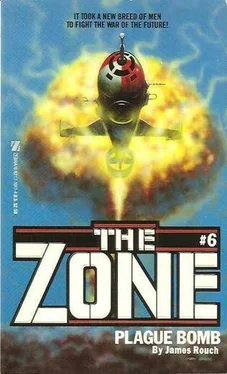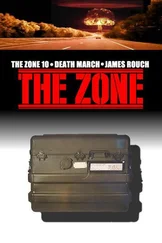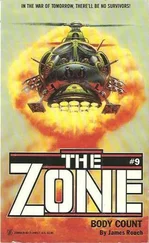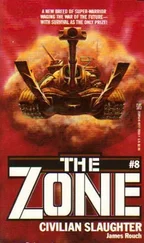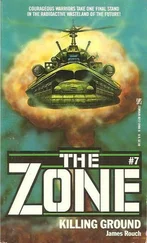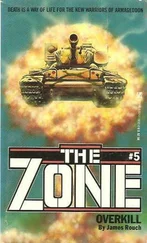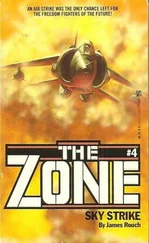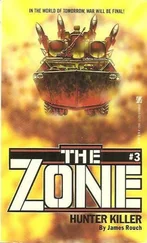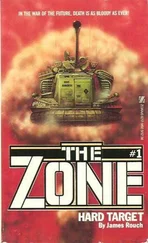There were parts of the Zone that the war had never touched, and they were motoring through one such now. The Bavarian towns and villages they passed were intact, needing only a splash of fresh paint on the pretty houses to restore them as they had been a year before, when the war had threatened to turn this way and the population had been evacuated.
Some traffic on the roads and they would have come back to life immediately, but there wasn’t going to be, and they wouldn’t. Eventually their turn would come, the battles would swirl even through this remote corner of southern Germany and then for a few hours or days at most, the names of the towns; and villages would be those mentioned in the world’s press, and then as the war moved on they would slide back into obscurity.
By then they would have ceased to exist save as smouldering ruins with a few tracks bulldozed through them. Another year after that and even those who had once lived here would have trouble in finding the most memorable or distinctive of landmarks, as nature took advantage of the head start destructive man had given her in finally reclaiming her territory. ‘This wagon is a real bastard.’ Gradually Burke was learning how to cope with the Marder’s peculiar handling characteristics, but already his arms ached from the strain of the constant corrections he had to make as the brakes, steering and suspension combined their faults to pull the vehicle to the left.
His complaint went unheard, as had all those before. Cotton from a first aid locker plugged the ears of those of the squad who didn’t have headsets. Clarence was one. Without a turret or remote controlled weapon to man he had wedged himself into an angle of the interior and concentrated on avoiding being jolted about the compartment. Occasionally an item of equipment that had been insecurely stowed, or a member of the squad who had relinquished a handhold at the wrong moment would bump into him. Inanimate objects he threw aside, bodies he fended off as best he could with the minimum of contact. He had to shout at the top of his voice to make himself heard to Revell, who stood with head and shoulders out of sight in the command cupola beside the turret.
‘Can’t we ease off on the speed? This old wreck just isn’t fit for it.’
‘It’s okay, we’ll be slowing soon.’ Ducking down to mime the words to the sniper, Revell pushed his throat microphone closer to communicate with the driver. ‘There’s a sharp right up ahead, take it.’
The sheer bulk of the vehicle meant that several times they had to take to the side as they negotiated the narrow winding side road as it began to climb. Overgrown hedges were crushed beneath the churning tracks, and great lumps of bark torn from trees, fences and gates half hidden by the brambles and vines entwined about them were splintered and flattened into the soft ground.
Gradually the hill steepened, until their forward progress was little better than a walking pace. Not that it brought any diminution in the decibel level, that stayed high as the engine strained to move the twenty-eight tons of men and weapons and armour up the twenty-two percent gradient. Seven of the eight available gears had been used by the time they reached the top.
‘I hope the fucking view was worth it.’ Dooley disentangled himself from ribbons of springy steel strip cut to open the packing cases. ‘For a shitty minute I thought we were going to have to get out and fucking push.’
The rear door had to be opened manually when the hydraulics developed a leak and sprayed a high pressure jet of fluid at the floor. The others learned by Dooley’s mistake when he slipped in the puddle, and stepped over it and him.
They’d stopped right on the brow of the hill, where a clearing gave them a panoramic view across the countryside. Dooley took one glance and then ignored it, choosing instead to concentrate on a detailed inventory of the contents of his pack to see if anything was missing after its several tumbling trips about the Marder’s interior. He’d hardly begun when Sergeant Hyde ordered him to help the Russian unload the electronic apparatus.
Revell swept the ground below through binoculars. ‘This is useless, worse than trying to look for a needle in a haystack.’ Despite his pessimism, he kept quartering until in exasperation at the futility of trying to visually search mile upon mile of thickly wooded country, he switched to checking at random the few stretches of road that were visible.
A few towns and villages showed against the mass of gently undulating green, but the roads running through them were masked by the multi-story buildings. ‘Is that gadget working yet? It’s our only hope.’
‘Ready, Major.’
Faster than could have seemed possible with Dooley’s assistance handicapping him, Boris had assembled the modules of the surveillance equipment and linked it by twin cables to a display tube and small control console he set on top of a stack of rotting fence posts. A final adjustment to the compact parabolic dish, supported by a thin legged tripod, aimed toward the low ground and then he activated the system. Immediately the self-checking circuits confirmed their condition by lighting a row of green bulbs below the screen.
‘Do a magnetic sweep first.’ Revell watched the screen come alive with a thousand glowing dots. Though randomly sprinkled, several distinct clusters showed, and when he looked up he realized they corresponded with the positions of the towns and villages. Farms in particular showed clearly, as the sensors registered the metal of the corrugated steel sidings of barns, and large feed and grain silos.
‘Try infra-red.’
This time the whole screen came alive with colour, but there were far fewer individual images. Against the dominant pink of the foliage, the soft white and pale blue of the concentrations of uninhabited buildings showed. In the middle distance a compact cluster of red dots had almost a pattern to their layout, while further away a solitary dark red trace was less sharp, fuzzily indistinct and pulsating.
‘Radar now.’
Again it was predominantly the metallic objects that registered, but it was more than that Revell was looking for. ‘Okay, shift back to IR again… now radar.’ There was no mistake, he’d read the screen correctly. ‘Got them.’ The lone distant trace was exactly the right size for a small vehicle without shielding around its engine or exhaust. With the picture rocking back and forth it became possible to see that the blurred infra-red image was like that because it alone of all those on the screen was moving, as the radar confirmed.
‘Stay on it long enough to get an accurate fix and a plot of the route they’re using, then dismantle this lot and get back on board as fast as you can.’
‘I think you should look at this, Major.’ Waiting until he had the officer’s attention, Boris indicated the pattern-like cluster of traces. ‘These are interesting.’ He slid his finger across the bevelled glass surface of the screen to point to some of the other dark marks. ‘Most of these hot traces I can identify. If you use your binoculars you will see that they correspond with the positions of fuel storage tanks, or oil cooled electricity sub-stations, places that accumulate heat and hold on to it, so that they register more noticeably on infra-red, but these,’ he brought attention back to the pattern, ‘they are at the centre of a patch of thick woodland, there is nothing there, no houses, no farms, nothing.’
‘Refugee camp? Cooking fires?’
‘At first I thought so, yes, but watch when I rock the image between IR and magnetic.’
The identical pattern showed in both modes. Revell didn’t need to ask if the equipment was functioning correctly, he could see the row of low intensity hooded green lights for himself. ‘Only one thing that can be; it’s the Russian battle group that’s been rampaging around here. And they’re right between us and those damned civilians.’
Читать дальше
